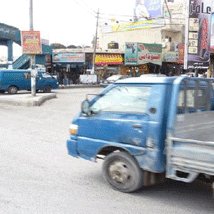This article was originally published on www.esmap.org on 13 September 2011. The ESMAP project outlined in the article, Developing an Energy Efficient Urban Transport Plan for Zarqa City Downtown Area, was implemented alongside a Cities Alliance-funded project to support the development of city development strategies in four Jordanian secondary cities (Karak, Mafraq, Zarqa and Tafilah) .

|
|
Photo courtesy ESMAP
|
The World Bank’s Energy Sector Management Assistance Program (ESMAP) has been working with Zarqa Municipality and the Government of Jordan since September 2010 on an urban mobility project to make Zarqa’s transportation energy efficient and environmentally friendly.
The final report on this project—Developing an Energy Efficient Urban Transport Plan for Zarqa City Downtown Area—was released in July 2011, and is intended to inform a new Zarqa Master Plan, which is being developed by Jordan’s Ministry of Municipal Affairs.
The report recommends actions to tackle congestion, reduce emission rates, improve public transport, stimulate economic activity and optimise energy consumption. There are eight “core” measures within the next three years, which will provide Zarqa Municipality with the necessary skills and technical tools to undertake 12 key “strategic” projects over the next decade.
By collating existing data, undertaking ‘snapshot’ traffic surveys and working closely with relevant stakeholders, a GIS model was developed to assess demand and travel patterns. Baseline emission measures were created, and validated against existing emissions and fuel sales.
The core measures include integrating transport and land use planning, installing traffic counters together with air quality monitoring stations and working in partnership with the Greater Amman Municipality. Strategic measures include improved and more reliable bus services to meet new demand patterns, new low-emission buses, a parking strategy, and junction and highway improvements. The cost of the initial core projects would be approximately US$3.5 million, while the strategic projects would cost US$83.4 million over ten years.
The report finds that, by 2020, the proposed measures would reduce vehicle travel time in the area by 10 per cent, fuel consumption by 13 percent, and vehicle emissions of CO2 by 25 per cent—when compared with not implementing such an action programme.
In order to take the recommended measures forward, Government departments will need to work closely with Zarqa Municipality to enable both skills and resources to be provided, and to take advantage of funding opportunities to secure the necessary finance.




